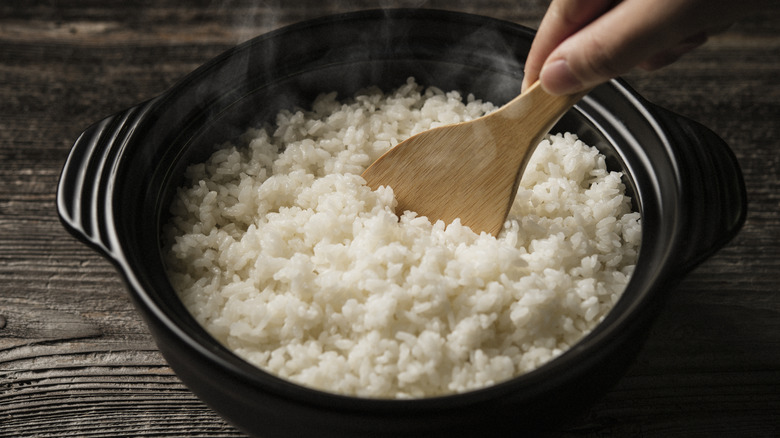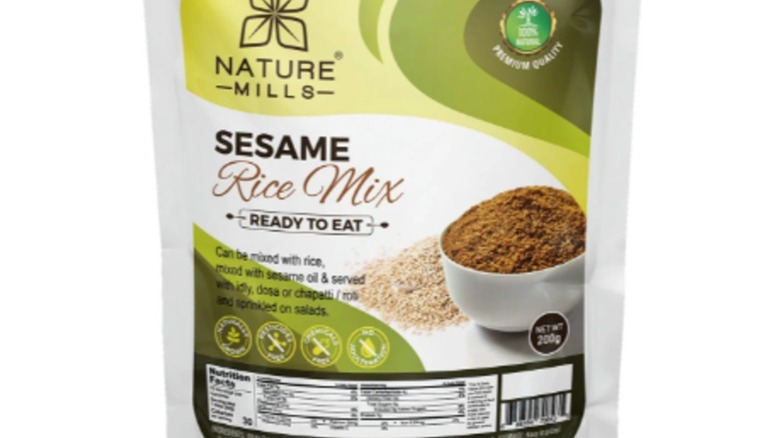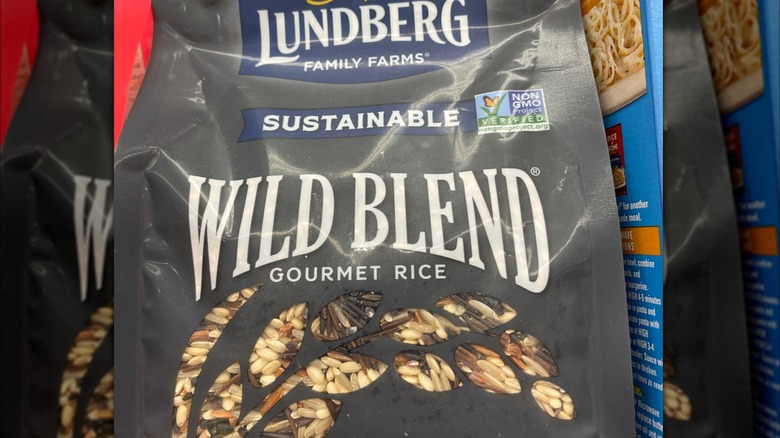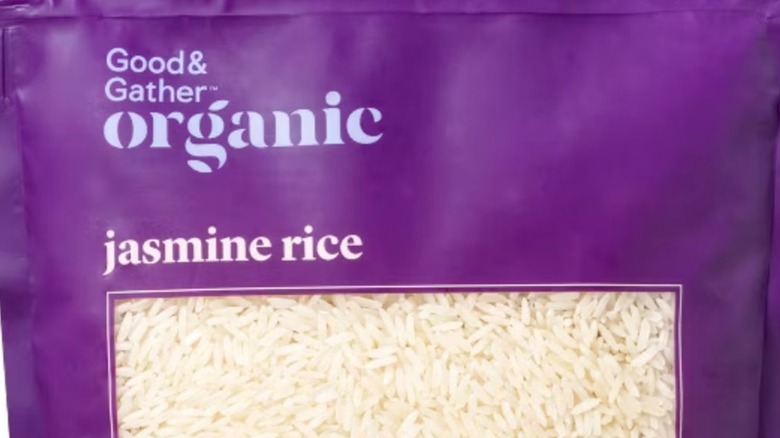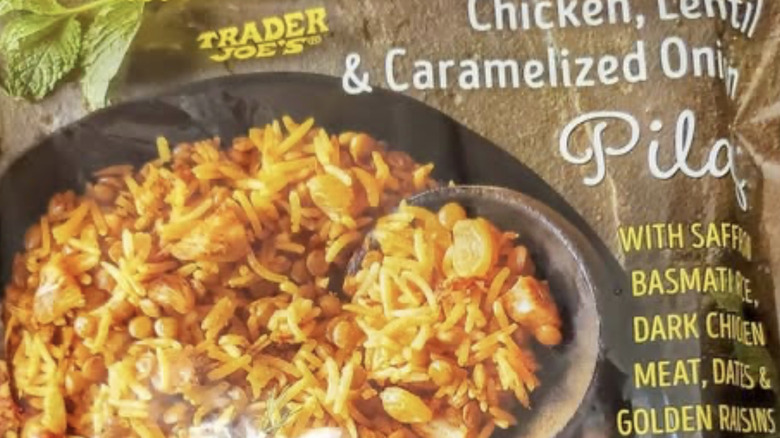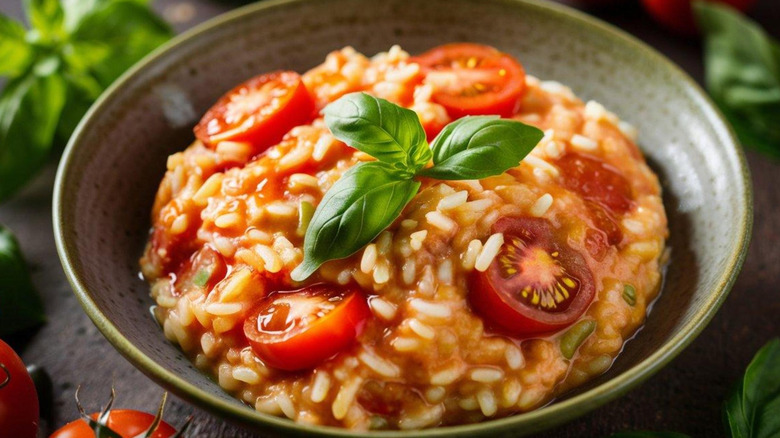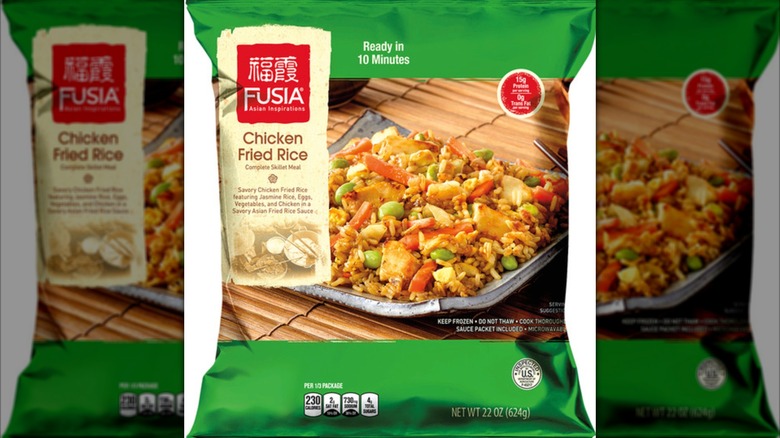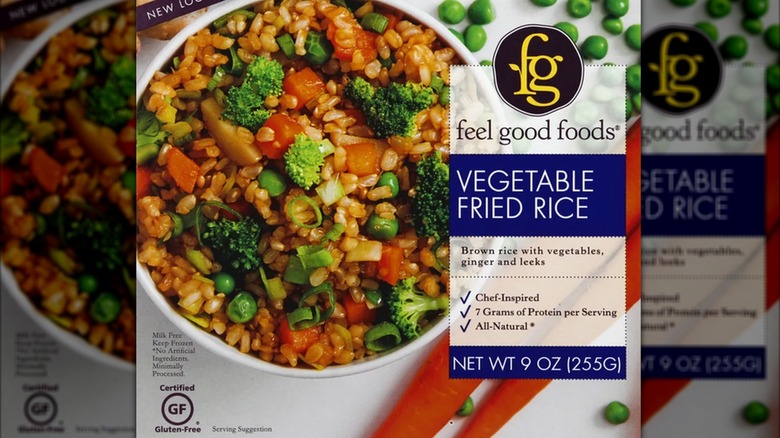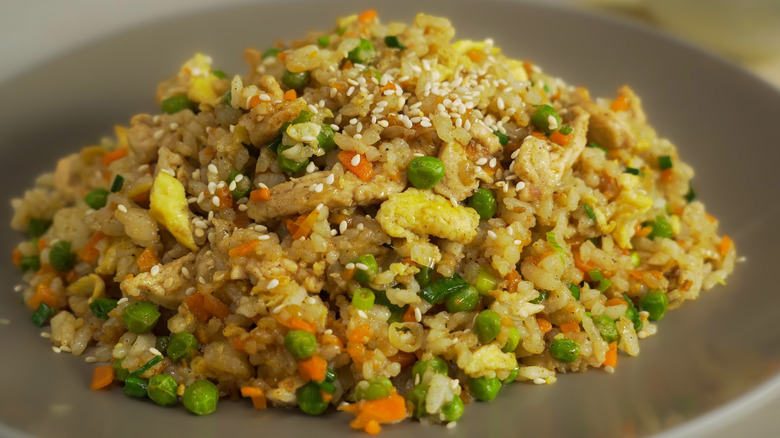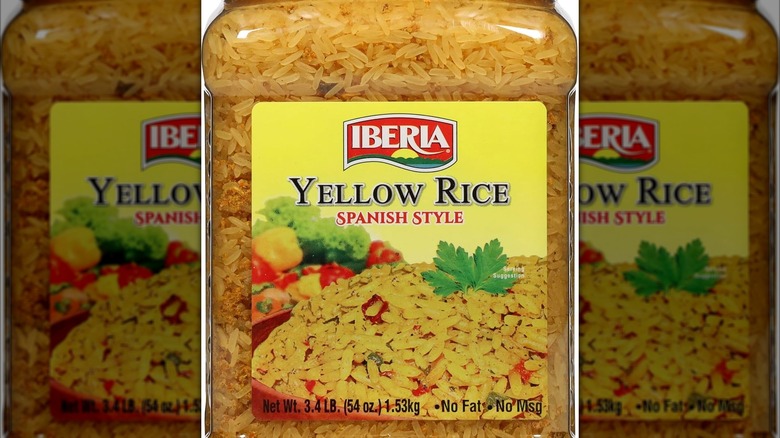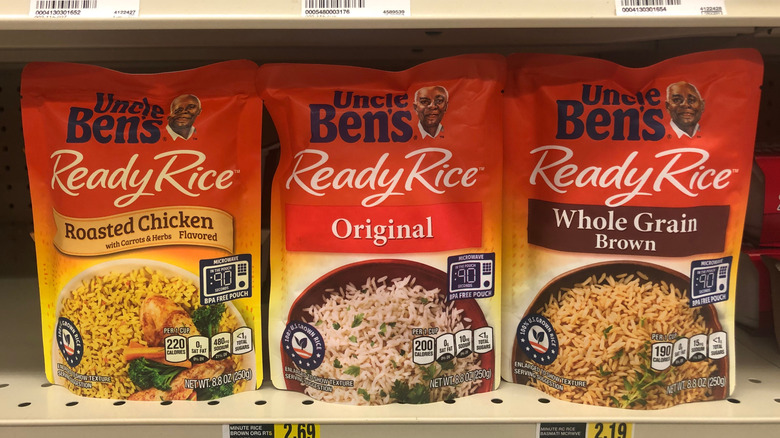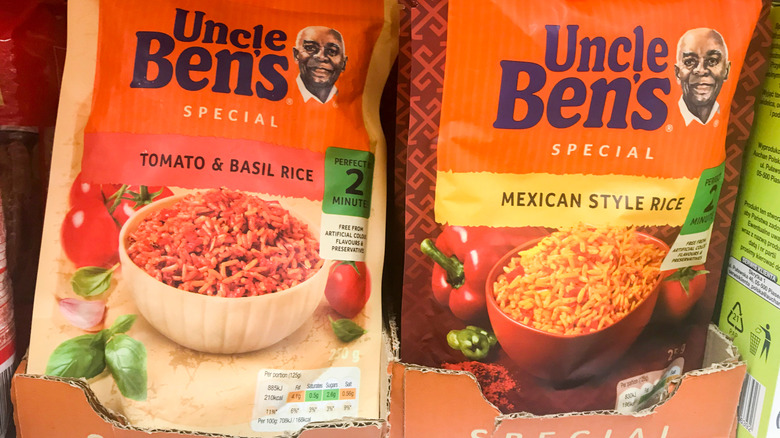Rice Recalls That Affected Millions
We may receive a commission on purchases made from links.
As it's a staple food and foundational grain for billions of people, and a primary ingredient in so many dishes across numerous culinary cultures, it's tough to underestimate the importance of rice. Whether it's white or brown, long grain or short grain, eaten on its own or with a traditional Indian, Chinese, Mexican, Japanese, Italian, or Spanish dish, to cite just a few examples, rice is a vital part of the global food chain and nutritional landscape.
That makes it all the more frightening, concerning, and potentially disastrous when rice is beset by danger. So much of it is harvested, dried, processed, packaged, and distributed that it invites plenty of opportunities for adulteration or contamination. Rice can be ruined, and turned into a conduit for injury or even death, by the presence of food-borne illness-causing bacteria, harmful allergens, inedible materials, poison, and other factors. Here are all of the times that rice makers have had little choice but to issue a recall, attempting to bring back all the bad rice it put out into the world so as to limit the harm to huge populations it would otherwise unleash.
NatureMills issued a recall for a year's worth of rice that contained allergens (2025)
NatureMills manufactures a number of rice-based, Indian and Indian-inspired packaged goods out of its main production facility in Texas. In addition to dried soup mixes, spice blends, porridges, and papads, many of NatureMills' products are rice-based mixes that combine dried rice with carefully selected spice blends. To get all the flavors right requires a host of ingredients, and during a self-audit, NatureMills representatives discovered that many of its products had been sent to market, sold, and consumed with common and potentially harmful allergens within, and that they hadn't been properly mentioned on the packaging.
On May 13, 2025, NatureMills issued a recall through the FDA, covering seven rice mixes, four soups, two spice blends, a porridge mix, and three rice-derived papad and vadam mixtures. A total of 17 different products and 56 separate batch codes were involved in the recall, which had been sold as early as December 1, 2023, and as late as May 10, 2025.
At that point, there hadn't been reported illnesses over customers accidentally ingesting ingredients to which they were allergic. All of those goods — including sesame rice, dal garlic rice, curry leaf rice, horsegram rice, and chili rice — may have contained remnants of wheat, milk, or sesame, and their presence hadn't been noted on the product, necessitating the recall.
Something left by rodents necessitated a rice recall by Lundberg Family Farms (2024)
Wild rice isn't actually rice, biologically speaking, but it resembles and tastes like the real deal in so many ways that it's more or less interchangeable with the authentic stuff. Wehah Farms, parent company of Lundberg Family Farms, is a major distributor of wild rice blends, and in May 2024, it instituted a recall of one particular product that had been sold in as many as seven states.
Lundberg Family Farms Sustainable Wild Blend Gourmet Rice is a combination of black, brown, red, and wild rice, as well as an extra, unintended ingredient in potentially 4,600 cases of the product. About 27,000 individual units of 16-ounce bags of the rice blend were ordered returned to the manufacturer.
Under FDA guidelines, the Class II recall meant that negative health effects were potentially in order for anyone who ate the tainted product. At some point in production, inedible material, reported to be originating in rodents, made its way into the rice. No illnesses related to eating the Lundberg Family Farms Sustainable Wild Blend Gourmet Rice had been reported at the time of the recall, or in the weeks after.
A rice company issued back-to-back recalls because of glass and insects (2024)
Potentially a red flag when grocery shopping at Target: Production of the big box retailer's relatively new Good and Gather grocery line is outsourced to numerous industrial food suppliers. Otis McAllister, for example, is responsible for Good and Gather Organic Jasmine Rice. In September 2023, Otis McAllister worked with the FDA to recall more than 2,900 cases of the jasmine rice, a quantity consisting of more than 17,400 individual, large-size 30-ounce pouches.
The possibly tainted product had been sent to 27 Target distribution facilities on their way to retail outlets. An inspection had uncovered the presence of insects in a sample of the rice, specifically rice weevils. While that's not an immediate pathogen, it's still gross enough that a recall was required.
That Otis McAllister recall was deemed over and settled by January 2024, but just two months later, the rice maker was already at work on another pull-back. In March 2024, the California-based company announced a recall of its Emerald River Premium Thai Jasmine Rice. Sold in grocery stores through Washington state, Texas, Utah, and Oregon, 2,700 bags of the bulk, 50-pound size of the product with an expiration date of September 2025 (135,000 pounds of product, in total) bore the possibility of containing a dangerous foreign object: tiny shards of broken glass.
A Trader Joe's rice mix included an extra ingredient: rocks (2024)
Trader Joe's shelves and freezers are stocked almost entirely with private label or store-branded edible merchandise. The small-supermarket chain contracts with many food manufacturers to produce its Trader Joe's-named products, including Mama Vicky's. In 2023 and 2024, Mama Vicky's was the real company behind Trader Joe's Chicken, Lentil, and Caramelized Onion Pilaf with Saffron Basmati Rice, Dark Chicken Meat, Dates, and Golden Raisins. The rice-based dish was sold in 14-ounce frozen packages, and designed to be a heat-and-eat product.
In early 2024, customer service channels at Trader Joe's fielded numerous complaints from people claiming to have purchased the rice pilaf, with most saying they bit into something hard and inedible in the product. It turned out to be small rocks, and they were introduced into the rice blend somewhere in the Mama Vicky's production process.
Trader Joe's notified the U.S. Department of Agriculture's Food and Safety Inspection Service, which issued a public health notice over the Chicken, Lentil, and Caramelized Onion Pilaf. That's slightly different from a recall, because Trader Joe's had discontinued the item by the time of the February 2024 announcement. The FSIS instructed consumers to search their freezers for the rice and to discard it (eating it could lead to severe internal injury or dental problems) or to immediately return it to their Trader Joe's outlet.
The presence of glass led to two big rice recalls (2022)
Whether it's the best risotto in Italy (according to Giada Laurentiis) or risotto made with the Wisconsin technique, the creamy and savory traditional dish often starts with arborio rice. That's what pre-made dinner kit company Factor uses when it sends out heat-and-eat risotto packs to its subscribers, and it was also the reason behind a July 2022 recall. Factor cited six different meals in its announcements: a vegan mushroom marsala with onion risotto, a sweet pea risotto, an onion and goat cheese risotto, a tomato and roasted vegetable risotto, a sweet corn risotto, and a shrimp and asparagus risotto.
Factor was compelled to ask for its meals back — nearly 149,000 units altogether (or over 133,000 pounds) — after it got some bad news from its rice supplier. The arborio rice, provided by another entity, potentially accidentally left a facility studded with bits of glass.
Signs point to the glass-contaminating arborio supplier being Woodland Foods. The Illinois-based rice distributor issued its own recall the same week as Factor's due to the possible presence of glass, asking for the return of more than 50,000 pounds overall of rice sold in 10 lot numbers in 25-pound bags under multiple brand names. Among the brands included in the recall: Woodland Ingredients, Sysco, and DGourmet.
Milk wasn't declared on some chicken fried rice labels, so it was recalled (2019)
Per federal law, the U.S. Food and Drug Administration requires food producers to clearly and accurately warn consumers through package labeling if the food inside contains even a trace of any of the most common food-based allergens. Those ingredients include sesame, tree nuts, eggs, and dairy items. If someone with an allergy purchases and eats a product that unknowingly contains a medically forbidden ingredient, great sickness or even death could occur. When a company makes and distributes a food which they discover after the fact contains an allergen, and they didn't disclose that information on the box or bag, generally a recall goes into effect.
This is precisely what happened in March 2019, with Choice Canning Company. The Pennsylvania packager discovered that between February 13 and February 19, 2019, it had produced two batches of Fusia Asian Inspirations Complete Skillet Meals, sold in 22 ounce bags. They'd been sent for sale in nine states, including California, Connecticut, Florida, New York, Texas, and Virginia, without correct labeling. Because milk had been used in the product without notation, Choice Canning recalled 35,459 pounds of chicken fried rice. Of that volume, just over 19,000 pounds was successfully recovered.
Eggs weren't listed on the label of hundreds of packages of fried rice (2018)
Brooklyn company Feel Good Foods makes frozen-sold fried rice dinners, and in October 2018 it started a recall of its Vegetable Fried Rice. Made from brown rice, assorted vegetables, and ginger, the Vegetable Fried Rice was certified and labeled as a gluten-free product, but six lots of the item produced in 2018 were spiked with a different common food allergen: eggs. Sold in nine-ounce containers at as many as 400 stores across the United States, rice meals with expiration dates ranging from October 2019 to January 2020 were subject to the recall, or 415 cases in all.
Feel Good Foods' Vegetable Fried Rice had been prepared with eggs at a facility, and then the allergen wasn't properly or fully removed from the finished product. With traces of eggs possibly in all those containers, none of the boxes announced that the food inside may contain egg, setting up allergic people for reaction, illness, or injury. No harmful effects were reported during the length of the recall, during which consumers were advised to return the Vegetable Fried Rice to the place of purchase.
Listeria fears triggered a fried rice recall (2016)
Texas-based Garland Ventures produces many brands of packaged foods, including An-Joy Asian Foods. One of that label's signature products is a 20-ounce cardboard pail that resembles a takeout container loaded with chicken fried rice, as well as peas, carrots, and soy sauce, fully cooked and intended for heat-and-serve purposes.
In May 2016, Garland Ventures received word from Ajinomoto Windsor Inc., the supplier it contracts to provide the fried rice for the An-Joy meals, that the vegetables it had used fell under a recall conducted by CRF Frozen Foods. That third company had discovered in some of its shipped-out products listeria monocytogenes, the pathogen that can cause the food-borne infection known as listeriosis. Especially at risk are the elderly, the immune-compromised, babies, and pregnant women, and listeriosis presents as with fever, aches, disorientation, balance issues, convulsions, and gastrointestinal effects, and, in severe cases, death.
Garland Ventures instituted its own recall of An-Joy Chicken Fried Rice, comprising 10 case codes that covered 114,870 pounds of product produced from September 2015 until March 2016, and distributed to facilities in Colorado, Georgia, Utah, and Missouri. No illness reports linked to An-Joy had been filed at the time of the recall, which netted a return of 20,590 pounds of fried rice, or less than 20% of the possibly tainted food.
Iberia Foods' yellow rice was recalled because it looked and tasted weird (2014)
Sometimes food just tastes wrong, or it smells wrong, or doesn't look like it's supposed to look. There's often nothing intrinsically toxic or dangerous about foods that have seemingly turned in such a way, but they're so unpalatable that food companies would have such a hard time selling them, or don't want to sustain a hit to their brand's reputation, that they will go ahead and recall the questionable items.
The Iberia Foods Corp. was more or less forced into such a situation in September 2014, when it received reports that its Yellow Rice Spanish Style product was giving off color and taste that differed from the norm. Chalking it up to a quality control issue, Iberia Foods recalled multiple lots of the dried and heavily seasoned rice, meant to be a pantry staple.
The problem in one of the production lines may have been a slight change in recipe, with supplemental Vitamin B1 switched out in favor of Vitamin B2 in another. Beyond that, Iberia never provided the public, or federal food safety agencies, any information as to why so much of its rice had a strange and unappealing taste and look.
Uncle Ben's rice was recalled for a packaging problem (2014)
Uncle Ben's rice has a new name: Ben's Original. But in late February 2014, under its original branding, umbrella company Mars Food U.S. recalled a large quantity of the brand's flagship convenience rices because of consistency issues with both the product and the packaging in which it was distributed to stores around the country. During an internal inspection, Mars employees noticed a significant number of 8.8-ounce boxes of Uncle Ben's Ready Rice Original Enriched Long Grain White Rice were riddled with holes.
Those samples came from production lots that had already been shipped out to grocery and retail stores in 20 states, primarily in the U.S. southeast and Midwest. Determining that other boxes out of sight had also been punctured, and similarly leading to spoiled rice inside, a recall went out requesting the return of 3,329 cases of product, or roughly 40,000 boxes. No accounts of illnesses were reported during the time in which the recall was active, although the rice reportedly boasted both an incorrect appearance and smell.
Uncle Ben's rice was recalled after causing a spate of mild illnesses (2014)
Almost simultaneously with the recall of 40,000 units of Ready Rice due to hole-laden boxes full of rice gone wrong, Uncle Ben's rice was subject to a second manufacturer return program, and for possibly much more serious and mysterious reasons. On February 6, 2014, Mars U.S. recalled 140,225 units total of Uncle Ben's Infused Rice Mexican Flavor. The company had received complaints from the public that after eating the seasoned rice, they experienced a mild flushing sensation, but which both appeared and disappeared in a matter of hours. Recalled were five-pound and 25-pound wholesale-intended permutations of the Uncle Ben's rice.
Three days later, the recall expanded to include more products and sizes in the Uncle Ben's Infused line. Mars asked customers to return for refund five- and 25-pound containers of chicken, garlic and butter, pilaf, saffron, cheese, and Spanish varieties. Consumption of those products also led to flushing, and Mars believed a production issue was to blame, but it didn't disclose any other clarifying information.
